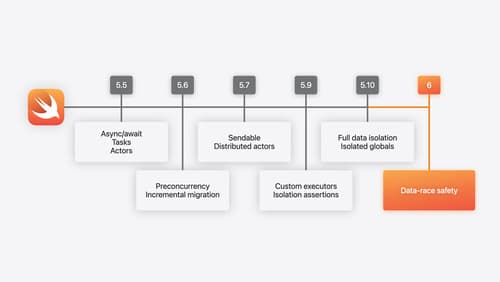How can I get c++ working in swift?
Asked on 2024-08-03
1 search
To get C++ working in Swift, you can leverage Swift's interoperability with C and C++. This allows you to call C++ code from Swift and vice versa. Here are some key points and resources from WWDC sessions that can help you:
-
Interoperability with C and C++:
- Swift has first-class support for interoperability with C and C++. This means you can directly call C++ functions and use C++ types in your Swift code.
- C++ virtual methods, default arguments, and move-only types are mapped to their Swift equivalents. For example, C++ move-only types are mapped to non-copyable types in Swift, and the Swift compiler will handle the necessary constructor calls and diagnose any unintentional copies.
You can learn more about this in the session What’s new in Swift (21:47).
-
Using Bridging Headers:
- If you have a third-party SDK written in C++, you can use a bridging header to import the SDK's APIs into Swift. This allows you to call C++ functions directly from your Swift code.
- You might need some additional setup, such as CMake logic and boilerplate files, to build your Swift code on top of the C++ SDK.
This is demonstrated in the session Go small with Embedded Swift (03:54).
-
Building Wrappers and Abstractions:
- While you can call C++ APIs directly from Swift, it is often beneficial to build Swift wrappers and abstractions around these APIs. This makes your Swift code more clean, intuitive, and ergonomic.
This approach is discussed in the session Go small with Embedded Swift (06:17).
-
Example Projects and Documentation:
- Apple provides example projects and documentation to help you get started with C++ interoperability in Swift. These resources can guide you through the setup and usage of C++ code in your Swift projects.
For more details, you can refer to the session Port advanced games to Apple platforms (08:37).
By following these guidelines and utilizing the resources provided in the WWDC sessions, you can effectively integrate C++ code into your Swift projects.

Port advanced games to Apple platforms
Discover how simple it can be to reach players on Apple platforms worldwide. We’ll show you how to evaluate your Windows executable on Apple silicon, start your game port with code samples, convert your shader code to Metal, and bring your game to Mac, iPhone, and iPad. Explore enhanced Metal tools that understand HLSL shaders to validate, debug, and profile your ported shaders on Metal.

What’s new in Swift
Join us for an update on Swift. We’ll briefly go through a history of Swift over the past decade, and show you how the community has grown through workgroups, expanded the package ecosystem, and increased platform support. We’ll introduce you to a new language mode that achieves data-race safety by default, and a language subset that lets you run Swift on highly constrained systems. We’ll also explore some language updates including noncopyable types, typed throws, and improved C++ interoperability.

Platforms State of the Union
Discover the newest advancements on Apple platforms.
